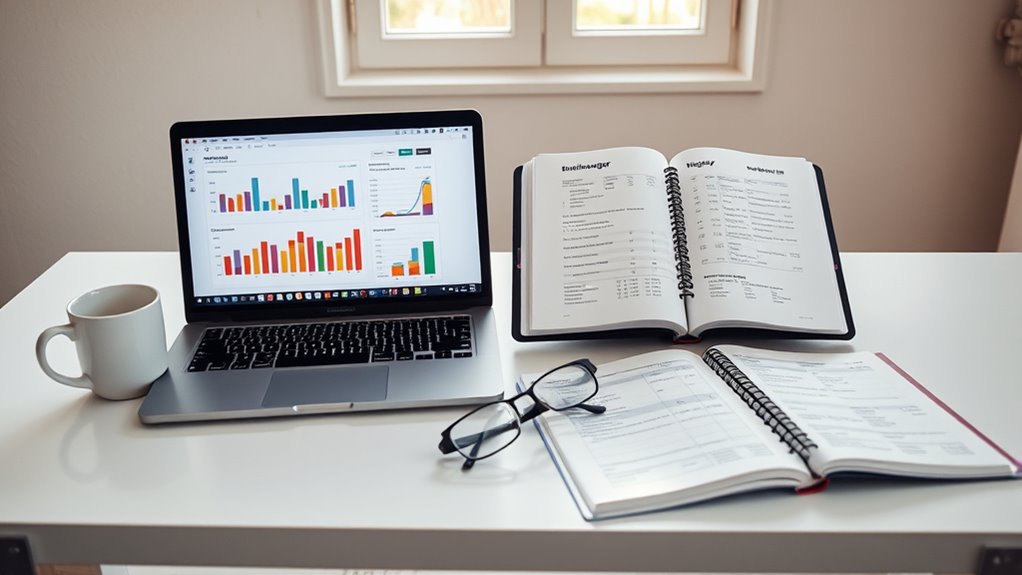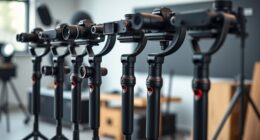Separating your personal and business expenses is key to achieving financial wellness. It helps you track income and costs accurately, making tax time much easier and maximizing your deductions. Clear boundaries prevent confusion, improve cash flow management, and give you a better picture of your business’s health. By establishing dedicated accounts and keeping detailed records, you’ll stay organized and make smarter financial decisions. Keep going to discover how these steps can truly boost your financial stability.
Key Takeaways
- Separating expenses improves financial clarity and simplifies bookkeeping for better decision-making.
- Clear boundaries maximize tax deductions and ensure accurate tax reporting.
- Using dedicated accounts helps track business expenses and control cash flow effectively.
- Proper separation prevents financial mismanagement and supports long-term business growth.
- Organized expense records promote financial wellness and facilitate audit readiness.

Have you ever wondered what true financial wellness really looks like? It starts with understanding the importance of separating your personal and business expenses. When these two areas are mixed, it becomes challenging to track your income and expenses accurately, which can hinder your ability to make informed financial decisions. Keeping clear boundaries not only simplifies your bookkeeping but also maximizes your potential for tax deductions, ultimately improving your cash flow management. When your business expenses are distinct from personal costs, you can easily identify deductible items like office supplies, travel, or marketing expenses, reducing your taxable income and increasing your savings at tax time. This clarity guarantees you’re not overlooking legitimate deductions that could lower your tax bill, contributing to your overall financial wellness.
Separating personal and business expenses maximizes deductions and simplifies cash flow management for better financial wellness.
Separating expenses also helps you develop a more accurate picture of your business’s financial health. Without clear boundaries, it’s easy to underestimate expenses or overstate income, leading to inaccurate financial statements. When you consistently categorize and track expenses, you gain better control over your cash flow. Cash flow management becomes more straightforward because you know exactly how much money is coming in and going out, allowing you to plan for future expenses or investments. This discipline enables you to avoid unnecessary debt, prepare for slow periods, and allocate funds efficiently, all vital elements of financial wellness. Additionally, adopting organized record-keeping practices aligned with home improvement principles can further enhance your financial clarity.
Creating dedicated accounts for personal and business finances is a practical step toward this separation. Having a separate business bank account simplifies tracking and guarantees that business transactions aren’t muddled with personal spending. When you review your statements regularly, it becomes easier to identify areas where you can cut costs or optimize spending. Additionally, maintaining clear records of business expenses supports accurate tax reporting and simplifies the audit process if needed. Staying organized and diligent in your record-keeping also helps you claim all eligible tax deductions, which can greatly reduce your taxable income and increase your cash flow.
Ultimately, separating personal and business expenses isn’t just about compliance; it’s about empowering yourself with a clear financial picture. This discipline fosters better decision-making, enhances your ability to manage cash flow, and guarantees you’re maximizing tax deductions. When you treat your business finances with the same care and attention as your personal finances, you lay a strong foundation for long-term financial wellness. It’s a straightforward but powerful step toward achieving financial stability, growth, and peace of mind.
Frequently Asked Questions
How Often Should I Review My Expense Categories for Accuracy?
You should review your expense categorization regularly to keep your finances accurate. Ideally, do a financial audit monthly or quarterly, checking for misclassified expenses or errors. This helps make certain your records reflect your actual spending and improves tax accuracy. By staying on top of expense categorization, you catch mistakes early and maintain clear financial insights, making future planning easier and more reliable.
What Are the Common Pitfalls in Separating Personal and Business Expenses?
You should be aware of common pitfalls like expense misclassification and inconsistent record keeping. These mistakes can lead to inaccurate financial reports and potential legal issues. To avoid them, consistently categorize expenses correctly and keep detailed, organized records. Regular reviews help catch errors early, ensuring your personal and business finances stay separate. Staying vigilant minimizes risks and maintains your financial health, making tax time smoother and protecting your business’s integrity.
Can Mixing Expenses Impact My Tax Deductions?
Mixing expenses can definitely impact your tax deductions because it often leads to tax deduction errors and poor expense categorization. When personal and business expenses get blurred, you might claim deductions you’re not entitled to or miss out on legitimate ones. This can trigger audits or penalties. To maximize your deductions and stay compliant, keep personal and business expenses separate and accurately categorized throughout the year.
What Tools Can Help Track Personal vs. Business Expenses Effectively?
To track personal versus business expenses effectively, you can use expense tracking apps like QuickBooks, Expensify, or Wave. These financial management tools simplify organizing your expenses, making it easier to separate personal from business costs. They often sync with your bank accounts and credit cards, providing real-time updates. By leveraging these tools, you gain clarity, improve accuracy, and make certain you’re maximizing your deductions without hassle.
How Do I Handle Expenses That Are Partially Personal and Partially Business?
When you encounter mixed expenses, you need to handle expense allocation carefully. First, review your receipts and categorize each part as personal or business. For partially business expenses, allocate the appropriate portion based on usage or percentage. Keep detailed records of your calculations, so you can justify your expense allocations during tax time. Properly managing mixed expenses guarantees accurate financial reporting and helps you stay compliant.
Conclusion
By keeping your personal and business expenses like two clear streams, you create a steady river of financial wellness. When you avoid mixing them, your financial landscape stays clean and navigable, preventing storms of confusion and chaos. Think of it as tending a garden—separating your plants guarantees each one gets the right nutrients to flourish. Staying disciplined today plants the seeds for a secure, thriving financial future you can confidently walk through.










